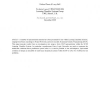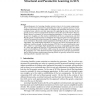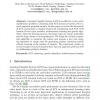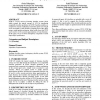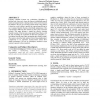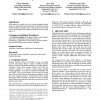164
click to vote
GECCO
2011
Springer
14 years 5 months ago
2011
Springer
—A number of representation schemes have been presented for use within Learning Classifier Systems, ranging from binary encodings to Neural Networks, and more recently Dynamical ...
121
click to vote
EC
2006
15 years 2 months ago
2006
The performance of a learning classifier system is due to its two main components. First, it evolves new structures by generating new rules in a genetic process; second, it adjust...
100
click to vote
AUSAI
2008
Springer
15 years 4 months ago
2008
Springer
Learning Classifier System (LCS) is an effective tool to solve classification problems. Clustering with XCS (accuracy-based LCS) is a novel approach proposed recently. In this pape...
108
click to vote
GECCO
2006
Springer
15 years 5 months ago
2006
Springer
XCSF is a novel version of learning classifier systems (LCS) which extends the typical concept of LCS by introducing computable classifier prediction. In XCSF Classifier predictio...
114
click to vote
GECCO
2007
Springer
15 years 6 months ago
2007
Springer
In this study we deal with the mixing problem, which concerns combining the prediction of independently trained local models to form a global prediction. We deal with it from the ...
100
click to vote
GECCO
2007
Springer
15 years 6 months ago
2007
Springer
The learning in a niche based learning classifier system depends both on the complexity of the problem space and on the number of available actions. In this paper, we introduce a ...
124
click to vote
CEC
2005
IEEE
15 years 7 months ago
2005
IEEE
The XCS Learning Classifier System has traditionally used roulette wheel selection within its genetic algorithm component. Recently, tournament selection has been suggested as prov...
185
click to vote
IWCLS
2007
Springer
15 years 8 months ago
2007
Springer
Learning Classifier Systems use evolutionary algorithms to facilitate rule- discovery, where rule fitness is traditionally payoff based and assigned under a sharing scheme. Most c...
127
click to vote
GECCO
2007
Springer
15 years 8 months ago
2007
Springer
An agent population can be evolved in a complex environment to perform various tasks and optimize its job performance using Learning Classifier System (LCS) technology. Due to the...
121
Voted
GECCO
2007
Springer
15 years 8 months ago
2007
Springer
In this paper, we describe the use of a modern learning classifier system to a data mining task. In particular, in collaboration with a medical specialist, we apply XCS to a prima...
